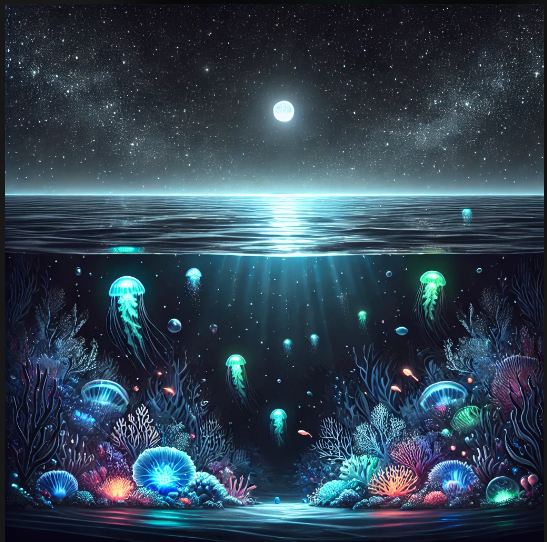Oceans cover more than 70% of the Earth’s surface and hold approximately 97% of the planet’s water. Beyond their vast expanse, they are a treasure trove of resources, offering immeasurable benefits to humanity and the ecosystem. Oceans are not just bodies of water; they are dynamic systems brimming with life, energy, minerals, and untapped potential. This article delves into the multifaceted wealth contained in our oceans, exploring their ecological, economic, and social significance.
Biological Wealth: The Ocean’s Living Resources
One of the most remarkable features of oceans is their biodiversity. Home to millions of species, ranging from microscopic plankton to the colossal blue whale, oceans are the cradles of marine life. They support diverse ecosystems such as coral reefs, mangroves, and deep-sea trenches.
- Fisheries and Aquaculture: Oceans provide a significant proportion of the world’s protein through fish and other seafood. Fisheries are crucial for food security, especially in coastal regions. Aquaculture, the farming of fish, shellfish, and aquatic plants, is growing rapidly, contributing to livelihoods and nutrition.
- Medicinal Resources: Marine organisms have been instrumental in the development of drugs and medical treatments. For instance, compounds derived from sponges and algae have been used to create cancer treatments, painkillers, and antibiotics.
- Biodiversity Hotspots: Coral reefs, often termed the “rainforests of the sea,” harbor an extraordinary variety of marine life. They not only support fisheries but also protect coastlines from erosion and storm surges.
Mineral Resources: Wealth Beneath the Waves
Oceans are a repository of mineral wealth, much of which remains untapped due to technological and environmental challenges.
- Hydrocarbons: Offshore oil and gas extraction has become a major industry. Countries with access to oceanic reserves benefit from these resources, which power industries and households globally.
- Polymetallic Nodules and Hydrothermal Deposits: The seabed is rich in polymetallic nodules, containing manganese, nickel, cobalt, and copper. Hydrothermal vents produce sulfide deposits rich in gold, silver, and rare earth elements essential for electronics and green technologies.
- Sand and Gravel: Coastal and offshore sand and gravel are used extensively in construction. While often overlooked, these materials are vital for infrastructure development.
Energy Resources: Power from the Deep
Oceans hold vast potential for renewable energy, which is crucial in the transition toward sustainable energy systems.
- Tidal and Wave Energy: Harnessing the power of tides and waves offers a predictable and sustainable energy source. Tidal barrages, underwater turbines, and wave energy converters are innovative technologies in this field.
- Offshore Wind Farms: The steady winds over oceans make them ideal locations for wind farms. Offshore wind energy has gained momentum as a clean and efficient power source.
- Thermal Energy Conversion: Oceans act as massive heat reservoirs. Ocean Thermal Energy Conversion (OTEC) technologies utilize the temperature difference between surface water and deep water to generate electricity.
Climate Regulation and Ecosystem Services
Oceans play a pivotal role in regulating the Earth’s climate and supporting ecosystems.
- Carbon Sink: Oceans absorb approximately 25% of the carbon dioxide emitted by human activities, helping mitigate climate change. Phytoplankton in the ocean contributes to the global carbon cycle by sequestering carbon.
- Climate Buffer: By absorbing heat, oceans regulate global temperatures and weather patterns. Currents like the Gulf Stream play a critical role in maintaining the Earth’s climate balance.
- Oxygen Production: Phytoplankton, the tiny plant-like organisms in the ocean, produce around half of the oxygen we breathe, highlighting the ocean’s role as a life-support system.
Economic and Social Importance
Oceans are integral to global trade, tourism, and the livelihoods of millions of people.
- Trade and Transport: The maritime industry is the backbone of global trade, with ships carrying goods across continents. Major shipping lanes crisscross the oceans, facilitating the movement of products and resources.
- Tourism and Recreation: Coastal areas and marine ecosystems attract millions of tourists annually. Activities like scuba diving, snorkeling, and cruising generate significant revenue for coastal economies.
- Employment and Livelihoods: From fishing to shipbuilding, oceans provide jobs for millions. Coastal communities, in particular, depend on the ocean for their livelihoods and cultural identity.
Challenges and Conservation Efforts
While oceans are rich in resources, they face significant threats from human activities and climate change.
- Pollution: Plastic waste, oil spills, and chemical runoff degrade marine ecosystems and threaten marine life. Microplastics have infiltrated even the deepest parts of the ocean.
- Overfishing: Unsustainable fishing practices deplete fish stocks, disrupt food chains, and endanger species.
- Climate Change: Rising sea levels, ocean acidification, and warming waters are altering marine habitats and impacting biodiversity.
- Conservation Strategies: Efforts like the establishment of Marine Protected Areas (MPAs), sustainable fishing practices, and global agreements like the Paris Accord aim to safeguard ocean health.
The Future of Ocean Resources
As technology advances, the potential of ocean resources becomes increasingly apparent. Innovations in deep-sea mining, renewable energy, and biotechnology promise to unlock new opportunities. However, sustainable management is essential to ensure that ocean resources benefit current and future generations.
- Blue Economy: Emphasizing sustainable use of ocean resources for economic growth, improved livelihoods, and ecosystem health, the blue economy is a key concept for the future.
- Global Collaboration: International cooperation is vital for addressing challenges like illegal fishing, marine pollution, and climate change. Organizations such as the United Nations and regional partnerships play a critical role
. - Public Awareness: Educating people about the importance of oceans and promoting responsible behavior can lead to better conservation outcomes.
Conclusion
Oceans are undeniably the storehouse of resources, offering immense ecological, economic, and social value. From providing food and energy to regulating the climate and supporting biodiversity, their contributions are unparalleled. However, the sustainable management of oceanic wealth is crucial to preserve this treasure trove for generations to come. By fostering innovation, promoting conservation, and encouraging global collaboration, humanity can unlock the full potential of oceans while safeguarding their health and resilience. Let us cherish and protect this invaluable resource—our oceans.




